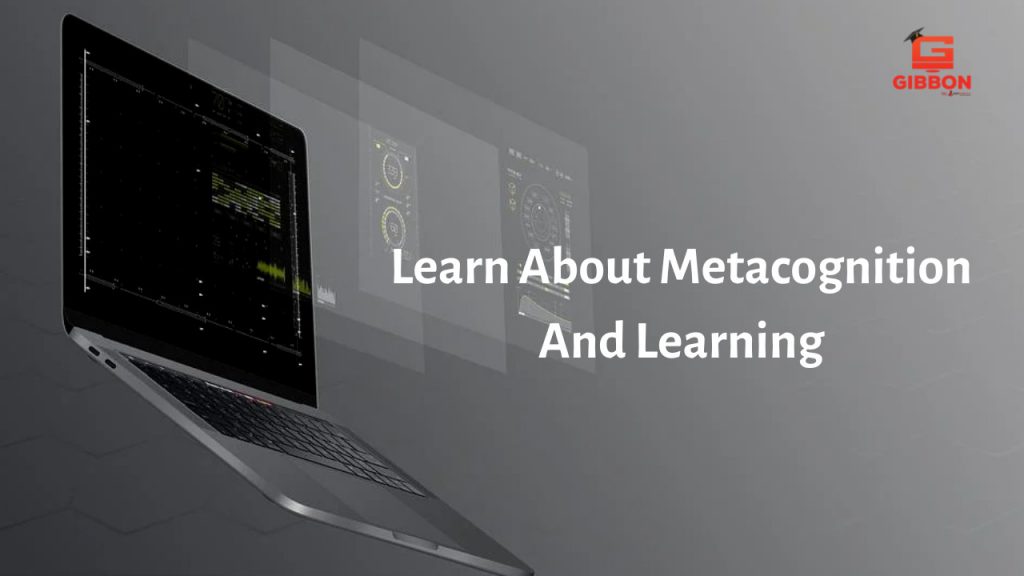Metacognition refers to the processes that occur when learners plan, monitor, assess, and modify their learning behaviors. The prefix ‘meta’ denotes ‘about’ the object. Metacognition is defined as “cognition about cognition” or “thinking about one’s thinking.”

It is becoming an increasingly valuable tool for improving student learning, both for immediate results and for assisting students in understanding their learning processes. As a result, the Metacognitive ability is a wide notion that relates to information and mental processes about how we learn.
With today’s smart online solutions such as Gibbon, you can provide all the modern learning environments to your audience. The learning process can be easily molded according to the students. You will also get a great set of tools that will help in building up your audience.
Advantage of Metacognition
- Metacognitive skills assist students in planning, monitoring, and evaluating their progress, as well as taking charge of their learning while they read, write, and solve issues in the classroom.
- According to research, metacognition is a major predictor of learning. Metacognitive activities contribute to learning in a unique way that goes beyond the effect of cognitive capacity.
- Metacognitive skills have been found to boost academic performance across a variety of ages, cognitive capacities, and learning areas.
- Students’ Metacognitive skills can assist them in transferring what they have learned from one context to the next, or from a previous task to a new task. The teacher can help by clarifying how what was learned in one activity can be applied to the next.
Best Uses of Metacognition
- Make professional growth in metacognition a top priority. An explicit emphasis should be placed on teaching both cognitive and metacognitive strategies, as well as how to build a learning environment that promotes the development of Metacognitive skills and motivation.
- Make learning objectives explicit and assist students in developing strategies and methods for tracking their progress toward reaching these objectives.
- Assist pupils in understanding their mid-and long-term objectives. Learners must use incentive methods in addition to metacognitive knowledge and regulation.
- Plan for a step-by-step approach to teaching effective metacognitive skill-building techniques, beginning with activating past knowledge and explicit strategy training and concluding with autonomous practice and organized reflection.
- In reading, experiment with reciprocal instruction. This is a well-known reading intervention that employs a Metacognitive ability.
- Teachers will work with small groups of students to demonstrate the use of four essential strategies: summarizing, questioning, clarifying, and forecasting.
- After that, the students are asked to teach these tactics to other pupils.
- To assist younger children in planning, monitoring, and assessing their learning, use artifacts or visual resources.
- Look for chances to stimulate thought and review regarding the metacognitive tactics utilized while debriefing a cognitive task.
Types of Metacognitive Learners
The metacognitive learners are mostly categorized into four groups as mentioned below.
1. Tactic
Learners that are ‘tacit’ are oblivious of their metacognitive knowledge. They do not consider any specific learning techniques and simply accept whether or not they know anything.
2. Aware
‘Aware’ learners are aware of some of the types of thinking they engage in – developing Metacognitive skills, gathering information, and so on – but their thinking is not purposeful or planned.

3. Strategic
‘Strategic’ learners organize their thoughts through problem-solving, grouping and categorizing, evidence gathering, decision making, and so on. They are aware of and employ learning processes.
4. Reflective
‘Reflective’ learners are not only strategic in their thinking, but they also reflect on their real-life challenges as it occurs, measuring the success of whatever techniques they use and then adjusting them as needed.
Benefits of Metacognition in Student Learning
- According to this study, Metacognitive skills can help compensate for any cognitive deficiencies that a learner may have.
- Being able to track their development allows children to take charge of their learning both inside and outside of the classroom.
- Identifying their achievements and failings, as well as which tactics work best for them – or have failed – enhances students’ persistence in improving their work.
- This style of teaching does not need the acquisition of any specialized equipment or other big purchases; it just necessitates that instructors be well taught in the process.
- The purpose of metacognitive practices assists students in transferring their knowledge and understanding across activities and settings such as reading comprehension, writing, mathematics, memorization, reasoning, and problem-solving.
- Researchers examined both primary and secondary children — as well as those who had not yet begun school – and discovered benefits in all circumstances.
- Students may think about ways to be happy, respected, and confident in themselves if they are conscious of their mental states. They are also more able to comprehend other people’s points of view.
Metacognition Learning Strategies
Before students can apply and evaluate various learning techniques, they must first get acquainted with some of them. You must educate children on how to learn while also providing opportunities for them to assess and revise their information. One method is to demonstrate your metacognitive ability to the students: show them how you would approach a problem, showing your thought process as you go.
For example, if you ask students to write a paragraph of an essay, you should write your example on the board, describing your selections (such as how you choose the appropriate topic terminology) and how you edit and enhance your work to make ways to achieve the goals.
This is highly beneficial to pupils because the purpose of metacognitive practices demonstrates how to achieve behind the scenes – the hardships that everyone goes through to become effective at a certain sort of profession. It demonstrates that humans are not born with the capacity to accomplish things; rather, our brains grow and improve as we practice (a growth mindset).
ABOUT GIBBON
Gibbon is a Plug and Play solution offered by EduGorilla, for anyone with a skill to teach. Gibbon helps you to take your classes online and earn independently.
- Gibbon gives you the ability to conduct & record LIVE classes, host unlimited video courses, provide online mock tests, and conduct online tests with LIVE proctoring abilities.
- Gibbon also provides you ready-made content of 1600+ Competitive, Entrance, and Academic exams from around the country.
- Gibbon helps you reach out to more students online and get a complete marketing setup.
- We have helped more than 3000 Brands, 10000 Institutes, 20000 Teachers and 2 Crore Students, transform their education and future.
Gibbon stands for “Online-Ready Teachers for a Future-Ready India”.
To get started, book your free demo now.






